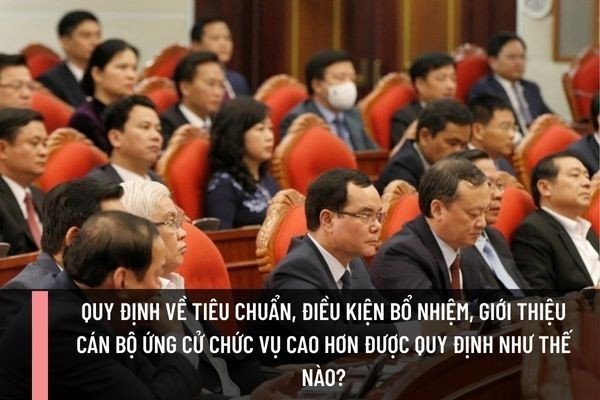Regulations on the Standards, Conditions for Appointment, and Nomination of Officials for Higher Positions: What Are the Provisions?
Regulations on Standards and Conditions for Appointment and Nomination of Cadres for Higher Positions
Pursuant to Article 18 of Regulation 80/QD-TW 2022 on standards and conditions for appointment and nomination of cadres for higher positions as follows:
- Ensure the general standards and specific standards of the appointed or nominated position as prescribed.
- Cadres introduced from internal personnel must be planned for the appointed position or an equivalent or higher position. External personnel must be planned for an equivalent or higher position. Special cases shall be considered and decided by the competent authority.
- Have held their current position or an equivalent position for at least 2 years. Special cases shall be considered and decided by the competent authority.
For the appointment of officers in the armed forces, the Central Military Commission and the Communist Party Committee of the Central Public Security shall stipulate specific requirements suitable to practical needs.
- Have complete and clear personal records, asset, and income declarations verified by competent authorities.
- Age: Cadres proposed for appointment to higher leadership and management positions for the first time in political system agencies must be of sufficient age to complete a full term. Special cases shall be considered and decided by the competent authority.
- Have adequate health to fulfill the assigned tasks.
- Cadres subject to disciplinary action shall not be assigned, appointed, or nominated to higher positions within the following periods (calculated from the date of the disciplinary decision):
+ 12 months for reprimand.
+ 30 months for warning.
+ 60 months for demotion.

Regulations on Standards and Conditions for Appointment and Nomination of Cadres for Higher Positions (Image from the Internet)
Principles of Appointment and Nomination of Cadres
Pursuant to Article 16 of Regulation 80/QD-TW 2022 on the principles of appointment and nomination of cadres as follows:
- Party committees, party organizations, and the collective leadership of agencies, units shall consider and decide on the appointment and nomination of cadres according to their authority; ensuring the leadership of the Communist Party, the principle of democratic centralism, objectivity, publicity, transparency, and full utilization of the authority and responsibility of each member and the leader.
- Based on the standards, conditions, qualities, ethics, capacity, strengths, and reputation of the cadres; also considering the requirements of performing the political tasks of the locality, agency, and unit.
- Ensure the stability, inheritance, and continuous development of the cadre team; improving the quality and efficiency of work.
- Do not appoint, nominate, transfer, confer, or promote military ranks for cadres and party members who are under disciplinary review.
Responsibility and Authority in the Appointment and Nomination of Cadres
Regarding the responsibility and authority in the appointment and nomination of cadres, Article 17 of Regulation 80/QD-TW 2022 stipulates:
- The collective leadership and heads of party committees, party organizations, agencies, units propose personnel and evaluate the proposed personnel.
- The collective leadership of party committees, party organizations, agencies, units discuss, evaluate, and make decisions or propose to the competent authority for consideration and decision.
- Individuals and collectives proposing; agencies appraising; collective deciding on cadres according to their authority must be responsible for their proposals, appraisals, and decisions. Specifically:
+ Individuals and collectives proposing: Bear primary responsibility before the competent authority for evaluating, commenting, and concluding on political standards, ethical qualities, lifestyle; working ability, strengths, weaknesses; asset, and income declarations... and their proposals.
+ Appraising agency: Responsible for the results of appraising, verifying, and reviewing information regarding the proposed personnel according to their functions, tasks, and authority.
+ Collective deciding on cadres: Responsible for its decisions in the appointment and nomination of cadres.
LawNet